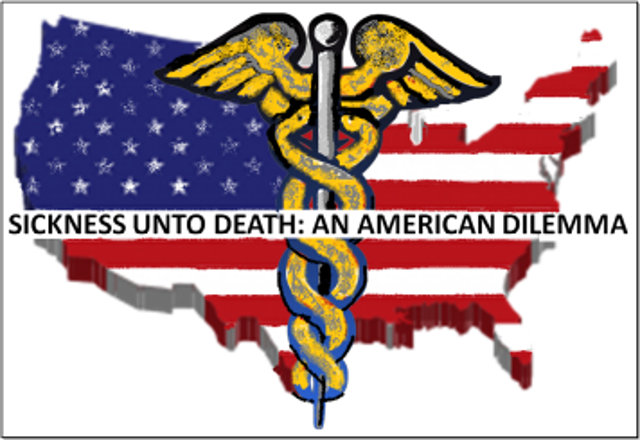Murphys, CA…Americans like to think of themselves as the wealthiest, healthiest, and luckiest country in the world. I won’t debate the first and last points here, but, the United States is decidedly not the healthiest. How do we know that?

Americans like to think of themselves as the wealthiest, healthiest, and luckiest country in the world. I won’t debate the first and last points here, but, the United States is decidedly not the healthiest. How do we know that?
How Long Will You Live?
One answer is measuring lifespan — how long is the average person likely to live? In the United States, that probability is 79.8 years (longer for white women, less for black men). But when compared to the rest of the world, the United States ranks 42nd. Really? The U.S. lags behind Japan (3), Israel (11), Italy (14), Sweden (16), Canada (19), United Kingdom (33), Germany (34), and even bankrupt Greece (35). (CIA 2017). If you are young enough and you want to live longer, move to Canada.
It is not that simple, though, as this difference is partially explained by three important variables: diet, lifestyle, and access to health care itself. Compare the health status of residents of Japan who live longer than Americans.
Prevention
Americans eat substantially more calories than residents of other countries. Americans consume, on average, 3,754 calories. The Japanese consume 2,768 calories. But when you look at the components of what is eaten, it is more striking. Americans eat 126 grams of sugar everyday; in Japan it is 56 grams. Americans consume 65 grams of fat every day, while the Japanese, with a diet more reliant on fish, only consume 45 grams. (Euromonitor 2017). The difference in obesity rates couldn’t be starker — 36% of Americans over the age of 15 are considered obese, while only 3.5% of Japanese are similarly categorized. (OECD 2017).
“Obesity raises the risk of morbidity from hypertension, dyslipidemia, type 2 diabetes mellitus (diabetes), coronary heart disease, stroke, gall bladder disease, osteoarthritis, sleep apnea and respiratory problems, and some cancers.” (Jensen, et. al., American Heart Association 2013). Comparing data from the United States and Japan for deaths due to cardiovascular disease finds that Americans die at a rate more than 70% higher than Japanese. The data may not establish causality, but if you are betting person, those are not great odds for Americans.
It Helps to be Rich
Second, this data suggests that health is related to lifestyle and one of the principle drivers for lifestyle is income. In a study just published by the American Medical Association, the data shows the wealthier lived much longer than those who are poor — males with the top 1% in income in the U.S. live fifteen years longer than males in the lowest 1%. (JAMA 2017). Lifespan is directly related to lifestyle and the economically poor are much more likely to have poorer nutrition, at much higher risk of being the victims of homicides, and be more susceptible to environmental risks.
This raises the question of the relationship between lifespan and income inequality. Here the numbers are particularly striking. The World Bank calculates the difference between a theoretically equal society (in terms of income) and the actual distribution of income in a nation (what economists call a Lorenz curve). The United States ranks 63rd among 167 nations such as El Salvador, Russia, Uruguay, Gabon, Turkmenistan, and Madagascar — in other words, the U.S. is very unequal in income distribution. Japan ranks 122nd, where the higher ranking represents less income inequality along with the United Kingdom, Ireland, Switzerland, and South Korea. (World Bank 2013, 2008). This raises a political (and ethical) question, which I will address in Part VII of this series.
I am Sorry, the Doctor is Unavailable
Third, lifestyle may account for a large part of a healthy life, but access to health care providers is important too. In the United States, the average adult visits a doctor four times a year. In Japan, the average number of visits is thirteen — or three times more often. (Commonwealth Fund 2010). The health care system in Japan is a mix of public and private control. The government mandates universal health care insurance with fees set by the government, while hospitals and clinics are controlled by doctors in not-for-profit corporations. Policy consistently demonstrates an effect on behavior — and given longer life spans in Japan, it suggests that that just might entail a positive effect.
Of course, there are limits to comparing Japan with the United States. Among other things, Japan is a nearly homogeneous society that has less than half the population of the U.S., yet lives in a territory the size of California. These are very important differences that should caution any argument that America should adopt the Japanese approach to lifestyle and health care.
Healthcare as an eco-system
But, health care is part of an eco-system — biological, social, economic, and technical. Eco-systems are, by definition, complex. Some complex systems maintain self-governing stability. Other complex systems exhibit a high degree of indeterminateness — the so-called butterfly effect. And yet other complex systems are inherently unstable, bordering on catastrophic decay. Before you start radically altering a complex system, we ought to know its current state — a two week debate in Congress would not seem to qualify for the kind of deliberation we should expect for something so important to our collective lives.
[To be continued next week]


